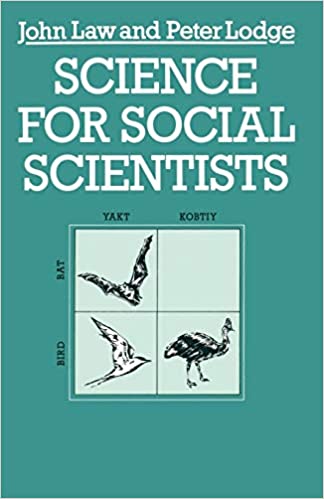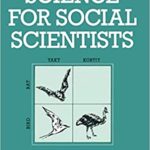
Glossário reticular de Law e Lodge (1984)
Glossário reticular de Law e Lodge (1984:285-8)
Transcrição quase integral do glossário oferecido ao final de Science for social scientists, de Law e Lodge (1984). Termos em negrito possuem entradas próprias no glossário.
ANOMALY: Troublesome inconsistency, frequently between the more theoretical and the more empirical sections, within a network. The term ‘misfit’ is used for an inconsistency that is not held to be troublesome or one that may be easily resolved. (Law e Lodge 1984:285)
CAUSE: A term used in a wide variety of ways in different philosophies of science. In network theory terms, the more interesting and explicit links transferred in the course of metaphorical redescription. (Law e Lodge 1984:285)
CLASS: A term in a network whose meaning (like that of all other classes) is determined by its relationship with other terms in that network (see intension) and the objects, events or relationships in the world to which it is applied (see extension). (Law e Lodge 1984:285)
COHERENCE CONDITIONS: The principles which organise the structure of a network. Some of these are assumed to arise from the way in which human beings perceive and classify information and may thus be called psychological coherence conditions. Others appear to be culturally defined and are described as social coherence conditions. Psychological coherence conditions are presumptively common to all networks, whereas social coherence conditions may differ between cultures. (Law e Lodge 1984:285)
CORRESPONDENCE THEORY: A theory of knowledge which claims that true knowledge is that which corresponds to that which it describes. This may be contrasted with a pragmatic theory of knowledge which criticises correspondence theory for vagueness. (Law e Lodge 1984:285)
EMPIRICISM: The doctrine that knowledge arises from sense experience. (Law e Lodge 1984:285)
EPISTEMOLOGY: The theory of knowledge; a branch of philosophy. (Law e Lodge 1984:285)
EXTENSION: The objects, events or relationships described or covered by a term. Closely related to intension. (Law e Lodge 1984:285)
FALSIFICATIONISM: Popper’s preferred scientific method: that scientists should (i) construct bold but empirically falsifiable theories, (ii) attempt to falsify them and that, having succeeded in this, they should (iii) then proceed to construct a more general but empirically falsifiable theory. (Law e Lodge 1984:285)
FUNCTIONALISM: An explanatory model in social science that stresses that social events and institutions are interconnected and mutually influential. In addition, it often advocates teleological explanation (phenomena are explained in terms of the functions they are supposed to play) and may also imply the use of an organic metaphor for society. (Law e Lodge 1984:285)
IDEALISM: The doctrine that the explanation of phenomena should be posed in terms of the power of ideas or the ideal: that reality is non-material. This is often set against materialism. (Law e Lodge 1984:285)
IDEOLOGY: A widely and diffusely used term normally used to describe knowledge that is (i) directed by social (e.g. class) interests, (ii) distorts reality by concealing its true (for instance, exploitative) nature, yet (iii) is nevertheless workable in day-to-day practice. The theory of ideology has been particularly developed in Marxist writing. Claim (ii) above is incompatible with the pragmatism of the network theory. (Law e Lodge 1984:286)
IMPARTIALITY: A part of the strong programme of the sociology of knowledge, the assumption that both true and false knowledge require explanation. (Law e Lodge 1984:286)
INCOMMENSURABILITY: The impossibility of translating one system of belief into the language of another; often posed in terms ofthe non-existence of a neutral observation language. (Law e Lodge 1984:286)
INDUCTION: The process of deriving general claims from empirical instances, and hence going beyond those instances. (Law e Lodge 1984:286)
INTENSION: Loosely, the meaning of a term (but see also extension). In network theory the properties in terms of which objects, events and relationships grouped together in a class are held to exhibit similarity. Thus the intension of the term ‘mammal’ includes ‘air breathing’ but not ‘terrestrial habitat’. (Law e Lodge 1984:286)
INTEREST IN NATURAL ACCOUNTING, PREDICTION AND CONTROL: One of the two basic interests that are assumed to underlie all knowledge. In this case, the aim is to describe, account for and explain events in order to interact more satisfactorily with the natural and social worlds. (Law e Lodge 1984:286)
INTEREST IN SOCIAL CONTROL AND LEGITIMATION: The other basic interest that is assumed to underlie all knowledge. Here the aim is to defend, legitimate or rationalise a general social position advantageous to the group deploying or using the knowledge. (Law e Lodge 1984:286)
INTERESTS: Explanatory attributes imputed to individuals or groups in order to understand their actions and knowledge. It is assumed that all knowledge is constructed and deployed (i) with the purpose of interacting more satisfactorily with the natural and social worlds and (ii) with the purpose of ensuring social advantage. In order to explain the generation and use of knowledge it is thus necessary to make a hypothesis about the problems which the knowledge is designed to resolve. The imputed interests are in turn used to explain what count as important problems. Though they relate to both motives and purposes, it is important to note (i) that they are properly used of social groups and not just individuals, and (ii) that they are structural and relational, i.e. a function of the relationship between groups. It should be emphasised that, just as the attribution of knowledge is an hypothesis, so too is the imputation of interests. (Law e Lodge 1984:286)
MARXISM: A set of explanatory models (and political commitments) originally associated with the writing of Marx that stresses the importance of (i) the material in general and the economic in particular; (ii) economic class, class antagonism and class contradiction; (iii) qualitative, and sometimes revolutionary, social change; and (iv) the importance of ideology in concealing class contradiction. Marxism is now a wide family of often incompatible doctrines. (Law e Lodge 1984:286)
MATERIALISM: The doctrine that the explanation of phenomena (and in particular knowledge) must start with the assumption that there is a material world, that reality is material. This is often set against idealism. (Law e Lodge 1984:286)
meaning: See intension, for a network theory interpretation. (Law e Lodge 1984:286)
METAPHOR: In the network theory of knowledge all classification is seen as metaphorical because it treats objects, events or relationships as if they were the same as other objects despite the fact that there are always dissimilarities. Hence there is no incompatibility between scientific theory and metaphor. Scientific theories are constitutively metaphorical. (Law e Lodge 1984:287)
NETWORK: A set of interrelated classes. More generally, a model for talking about knowledge, i.e. about the way in which both individuals and cultures classify and interpret events, objects or relationships in the world. The model does not discriminate strongly, as do some theories of knowledge or description, between theoretical and observational terms. It further assumes all terms (and hence the structure of the network) to be revisable. (Law e Lodge 1984:287)
NETWORK THEORY: A particular theory of knowledge or description. See network. (Law e Lodge 1984:287)
NEUTRAL OBSERVATION LANGUAGE: A language of observation that is assumed to be independent of theory and hence relatively stable. […] [It is] [a]ssociated with correspondence theory[…] [.] [N]etwork theory denies the possibility of a neutral observation language. (Law e Lodge 1984:287)
NORMAL SCIENCE: Science proceeding under the auspices of, and articulating a paradigm. (Law e Lodge 1984:287)
OSTENTION: The definition of a term by naming while showing or pointing out the phenomenon in question. (Law e Lodge 1984:287)
PARADIGM: A term from Kuhn’s history of science which refers to the complex of theoretical, methodological, practical and metaphysical commitments shared by a group of scientists. In Kuhn’s view the role of the practical is of particular importance. (Law e Lodge 1984:287)
PRAGMATIC THEORY OF KNOWLEDGE: A theory which argues that knowledge, even scientific knowledge, is best seen as a tool for dealing with practical problems. Thus the test of the adequacy of knowledge in this view is its workability in practice and not the degree to which it corresponds to what it describes (see correspondence theory). Network theory is a pragmatic theory of knowledge. (Law e Lodge 1984:287)
REFLEXIVITY: A part of the strong programme of the sociology of knowledge. The assumption that the sociology of knowledge can explain its own derivation in terms of the same kinds of factors as the derivation of other systems of knowledge. (Law e Lodge 1984:287)
RELATIVISM: A doctrine that asserts that there are no absolute standards against which the adequacy of a system of knowledge may be measured. Standards are rather local. The network theory is relativistic. (Law e Lodge 1984:287)
SCIENTIFIC REVOLUTION: A term from Kuhn’s history of science which refers to the major conceptual changes that occur from time to time in the history of science. These are interpreted as the abandonment of one paradigm by a group of scientists in favour of another. (Law e Lodge 1984:287)
SCIENTISM: The inappropriate adoption of a conception of science as a model for explanation in another domain. (Law e Lodge 1984:287)
SYMMETRY: A part of the strong programme of the sociology of knowledge. The assumption that all knowledge, and in particular that which is held to be true and that which is held to be false, may be explained in terms of the same kinds of factors. (Law e Lodge 1984:287)
TELEOLOGY: Explanation of phenomena not in terms of prior causes but rather in terms of their consequences. (Law e Lodge 1984:288)
THEORY: A relatively explicit section of a network taking the form of a ‘plausible story’ that has been metaphorically extended to new phenomena, and which is held to describe, account for or explain these. (Law e Lodge 1984:288)
VERSTEHEN: Loosely, the act of understanding the beliefs of another individual or group. It is often defined as the successful acquisition of the language of a group. In network theory, the acquisition and competent use of the network of the culture in question. (Law e Lodge 1984:288)
WELTANSCHAUUNG: World outlook, outlook on life. (Law e Lodge 1984:288)
WORKABILITY: A term used of networks in the pragmatic network theory of knowledge: a way of talking of the fact that the test for adequacy of a network is not its correspondence to reality but rather how well it serves the purposes of those who deploy it. (Law e Lodge 1984:288)
LAW, John; LODGE, Peter. 1984. Science for social scientists. London: Macmillan Press.




 O LaSPA é sediado no Instituto de Filosofia e Ciências Humanas (
O LaSPA é sediado no Instituto de Filosofia e Ciências Humanas (